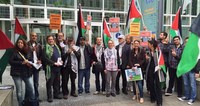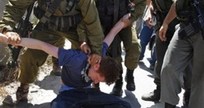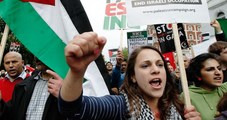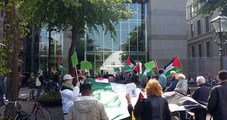18 june 2016

18th June 2016 | BDS Oldenburg, Germany
On 14 June, 2016, the Regional Court Oldenburg ordered Sara Rihl, local SPD politician and student member of the senate of the university of Oldenburg, not to repeat her statements relating to Christoph Glanz. Rihl had played a leading role in the prevention of an event scheduled by the Palestinian BDS campaign.
The lecture titled “BDS – the Palestinian Human Rights Campaign Introduces Itself” was to be held by the Oldenburg teacher and activist Christoph Glanz. Rihl had demanded the organiser – the Evangelische Studierenden Gemeinde (ESG) – to cancel the talk, and referred to the speaker as a “known anti-Semite” working for an “anti-Semitic organisation” in this connection. As a result, the ESG actually cancelled the planned event.
Glanz now successfully defended himself against this public assault. “We are happy to see that the local court has the defendant in her barriers and that she may not repeat those absurd statements if she doesn´t want to face severe penalties”, he commented. “We know the strategies of the Israel supporters who -lacking arguments- frequently use indimidation and slander including the antisemitism accusation to stop events such as the ones planned in Oldenburg. We are proceeding on the assumption that this court sentence will set a positive precedent for our movement and intend to reinforce our commitment to the just cause of the Palestinians even further.”
In 2005, Palestinian civil society called all people of the world including Israelis for active solidarity. After decades of suppression, displacement and occupation this call proclaimed a strategy that had already proven successful in the struggle against apartheid in South Africa. BDS calls for boycott, divestment and sanctions against the State of Israel until it fully accords Palestinians their rights as established in the Universal Declaration of Human Rights, dozens of UN resolutions and the Geneva Conventions.
These activities already made for a number of major successes in the past. At the same time, the State of Israel also intensifies its efforts to contain BDS and to drive it into illegality, in some cases successfully. Recently, however, more than 350 European human rights organisations, trade unions, churches, and political parties requested the EU to uphold the right to boycott. “What is remarkable is that some of these organisations do not even actively practise BDS themselves”, Christoph Glanz comments. “Their chief concern is their fundamental right as European citizens to act at their own political and moral discretion. This also includes a public debate which should not be characterised by fear and repression but by better arguments. Why don‘t our opponents face public discussion? All of our attempts to this end have come to nothing.”
Another talk on the same subject, to be held by the Israeli Ronnie Barkan, in the Oldenburg public venue, PFL, was also cancelled. In this case there had been threats of violence from the milieu of the Autonomist centre “Alhambra” whereupon the city withdrew from the already signed tenancy agreement. In this matter as well court proceedings are pending.
These incidents drew attention nationally and internationally. For example, Rolf Verleger weighed into the discussion and demanded the realisation of the event. Rolf Verleger is a former member of the Central Council of Jews in Germany. A group of Israelis promoting BDS also solidarised with Christoph Glanz and criticised the mentioned incidents as attacks against the freedom of expression:
“In a city which fought hard to get its university called after Carl von Ossietzky- the journalist and resistance fighter against the Nazis who was so well known for his sharp mind and pointed pen- we would expect to see a lively public debate, rather than silencing.“
Riya Hassan, the European coordinator of the BNC (the Palestinian “BDS National Committee”), evaluates the situation as follows: “This ruling is a serious blow to Israel’s war of repression against the BDS movement. The German government must now join the Swedish, Irish and Dutch governments in making clear that BDS is a legitimate movement that should be protected as a form of free speech.“
Hassan further stated: “Rather than seeking to repress BDS activism and free speech, Germans who are genuinely concerned with peace and justice the in the Middle East should work to end German military aid to Israel, which is a form of material support for its ongoing oppression of Palestinians.”
On 14 June, 2016, the Regional Court Oldenburg ordered Sara Rihl, local SPD politician and student member of the senate of the university of Oldenburg, not to repeat her statements relating to Christoph Glanz. Rihl had played a leading role in the prevention of an event scheduled by the Palestinian BDS campaign.
The lecture titled “BDS – the Palestinian Human Rights Campaign Introduces Itself” was to be held by the Oldenburg teacher and activist Christoph Glanz. Rihl had demanded the organiser – the Evangelische Studierenden Gemeinde (ESG) – to cancel the talk, and referred to the speaker as a “known anti-Semite” working for an “anti-Semitic organisation” in this connection. As a result, the ESG actually cancelled the planned event.
Glanz now successfully defended himself against this public assault. “We are happy to see that the local court has the defendant in her barriers and that she may not repeat those absurd statements if she doesn´t want to face severe penalties”, he commented. “We know the strategies of the Israel supporters who -lacking arguments- frequently use indimidation and slander including the antisemitism accusation to stop events such as the ones planned in Oldenburg. We are proceeding on the assumption that this court sentence will set a positive precedent for our movement and intend to reinforce our commitment to the just cause of the Palestinians even further.”
In 2005, Palestinian civil society called all people of the world including Israelis for active solidarity. After decades of suppression, displacement and occupation this call proclaimed a strategy that had already proven successful in the struggle against apartheid in South Africa. BDS calls for boycott, divestment and sanctions against the State of Israel until it fully accords Palestinians their rights as established in the Universal Declaration of Human Rights, dozens of UN resolutions and the Geneva Conventions.
These activities already made for a number of major successes in the past. At the same time, the State of Israel also intensifies its efforts to contain BDS and to drive it into illegality, in some cases successfully. Recently, however, more than 350 European human rights organisations, trade unions, churches, and political parties requested the EU to uphold the right to boycott. “What is remarkable is that some of these organisations do not even actively practise BDS themselves”, Christoph Glanz comments. “Their chief concern is their fundamental right as European citizens to act at their own political and moral discretion. This also includes a public debate which should not be characterised by fear and repression but by better arguments. Why don‘t our opponents face public discussion? All of our attempts to this end have come to nothing.”
Another talk on the same subject, to be held by the Israeli Ronnie Barkan, in the Oldenburg public venue, PFL, was also cancelled. In this case there had been threats of violence from the milieu of the Autonomist centre “Alhambra” whereupon the city withdrew from the already signed tenancy agreement. In this matter as well court proceedings are pending.
These incidents drew attention nationally and internationally. For example, Rolf Verleger weighed into the discussion and demanded the realisation of the event. Rolf Verleger is a former member of the Central Council of Jews in Germany. A group of Israelis promoting BDS also solidarised with Christoph Glanz and criticised the mentioned incidents as attacks against the freedom of expression:
“In a city which fought hard to get its university called after Carl von Ossietzky- the journalist and resistance fighter against the Nazis who was so well known for his sharp mind and pointed pen- we would expect to see a lively public debate, rather than silencing.“
Riya Hassan, the European coordinator of the BNC (the Palestinian “BDS National Committee”), evaluates the situation as follows: “This ruling is a serious blow to Israel’s war of repression against the BDS movement. The German government must now join the Swedish, Irish and Dutch governments in making clear that BDS is a legitimate movement that should be protected as a form of free speech.“
Hassan further stated: “Rather than seeking to repress BDS activism and free speech, Germans who are genuinely concerned with peace and justice the in the Middle East should work to end German military aid to Israel, which is a form of material support for its ongoing oppression of Palestinians.”
8 june 2016

On the evening of June 5th, 2016, 49 years into the occupation of the West Bank and Gaza, Jewish organizations and individuals worldwide speak out in support of the right of Palestinians to non-violently resist Israel’s illegal and inhumane occupation.
In a petition sent to numerous national parliaments and European Union institutions, the undersigned groups call for all international bodies “to use all their available means of diplomacy and power to compel the Israeli government to immediately halt its intimidation campaign against Omar Barghouti and the Palestinian-led BDS Movement”.
Appalled by the state-led bullying against non-violent resistance, the undersigned “wish to underscore a basic truth which seems to escape the current Israeli administration and its apologists: international citizens’ boycotts against ongoing abuse of international law are a legally-protected and fundamental civil right.
Civil boycotts are a key means of non-violent protest. They cannot, precisely, be interdicted, made illegal or punishable.”
So far, signatories of the petition include: Jewish peace organizations from the USA, Canada, UK, Ireland, Germany, France, Italy; as well as a hundred distinguished Jewish activists, such as Noam Chomsky, co-founder of Code Pink Medea Benjamin, former South African government minister Ronnie Kasrils, former Israeli human-rights lawyerFelicia Langer, the Israeli filmmaker Eyal Sivan and laureate of the Sakharov Prize for Human Rights Nurit Peled-Elhanan.
Original article with copy of petition and additional signatures at BNC official.
In a petition sent to numerous national parliaments and European Union institutions, the undersigned groups call for all international bodies “to use all their available means of diplomacy and power to compel the Israeli government to immediately halt its intimidation campaign against Omar Barghouti and the Palestinian-led BDS Movement”.
Appalled by the state-led bullying against non-violent resistance, the undersigned “wish to underscore a basic truth which seems to escape the current Israeli administration and its apologists: international citizens’ boycotts against ongoing abuse of international law are a legally-protected and fundamental civil right.
Civil boycotts are a key means of non-violent protest. They cannot, precisely, be interdicted, made illegal or punishable.”
So far, signatories of the petition include: Jewish peace organizations from the USA, Canada, UK, Ireland, Germany, France, Italy; as well as a hundred distinguished Jewish activists, such as Noam Chomsky, co-founder of Code Pink Medea Benjamin, former South African government minister Ronnie Kasrils, former Israeli human-rights lawyerFelicia Langer, the Israeli filmmaker Eyal Sivan and laureate of the Sakharov Prize for Human Rights Nurit Peled-Elhanan.
Original article with copy of petition and additional signatures at BNC official.
7 june 2016

New York Governor Andrew Cuomo signed an executive order, on Sunday, that will penalize people and businesses in support of the non-violent movement to boycott of Israel.
In a speech to The Harvard Club, Cuomo said that New York would “lead by example.”
“We are also a place of action,” he continued: “We want to take immediate action because we want Israel to know that we’re on their side. If you boycott against Israel, New York will boycott you.”
After completion of the process, executive-branch companies will be required to distance themselves from any organization or person on the list.
“The State of New York will not permit its own investment activity to further the BDS campaign in any way, shape or form, whether directly or indirectly,” the order states.
Legal organizations have previously labeled attempts to push forward anti-BDS legislation “21st Century McCarthyism,” and warned that it would create a “blacklist” of human rights advocates, mirroring the treatment of those who campaigned against Apartheid in South Africa.
The Center for Constitutional Rights, National Lawyers Guild, the New York Civil Liberties Union and Palestinian Legal have continuously called anti-BDS pressure politically motivated and an attack on the freedom of speech.
The New York legislature attempted to push through an anti-boycott motion for months due to pressure from pro-Israel lobby groups, but was unsuccessful.
The latest move by Cuomo has widely been seen as an attempt to sidestep the legal process and implement the policy on his own, Salon reports, according to the Palestine News Network (PNN).
In a speech to The Harvard Club, Cuomo said that New York would “lead by example.”
“We are also a place of action,” he continued: “We want to take immediate action because we want Israel to know that we’re on their side. If you boycott against Israel, New York will boycott you.”
After completion of the process, executive-branch companies will be required to distance themselves from any organization or person on the list.
“The State of New York will not permit its own investment activity to further the BDS campaign in any way, shape or form, whether directly or indirectly,” the order states.
Legal organizations have previously labeled attempts to push forward anti-BDS legislation “21st Century McCarthyism,” and warned that it would create a “blacklist” of human rights advocates, mirroring the treatment of those who campaigned against Apartheid in South Africa.
The Center for Constitutional Rights, National Lawyers Guild, the New York Civil Liberties Union and Palestinian Legal have continuously called anti-BDS pressure politically motivated and an attack on the freedom of speech.
The New York legislature attempted to push through an anti-boycott motion for months due to pressure from pro-Israel lobby groups, but was unsuccessful.
The latest move by Cuomo has widely been seen as an attempt to sidestep the legal process and implement the policy on his own, Salon reports, according to the Palestine News Network (PNN).
4 june 2016

The Palestine House in Amsterdam and Dutch pro-Palestine groups participated in a protest sit-in to demand a local company to end its business ties with Israeli firms.
According to the information office of the Palestinians in Europe, the sit-in took place outside the headquarters of the Dutch company, AIRBNB, at the World Trade Center in Amsterdam.
The participants condemned the company for dealing with Israeli firms working in and for Jewish settlements in the occupied West Bank.
In another event, the Palestinian Forum and Palestinian Youth in Denmark on Friday organized a sit-in in solidarity with the Gaza Strip on a main street in Aarhus city. The participants carried banners denouncing Israel's blockade on Gaza and the international silence towards the humanitarian suffering of its population.
According to the information office of the Palestinians in Europe, the sit-in took place outside the headquarters of the Dutch company, AIRBNB, at the World Trade Center in Amsterdam.
The participants condemned the company for dealing with Israeli firms working in and for Jewish settlements in the occupied West Bank.
In another event, the Palestinian Forum and Palestinian Youth in Denmark on Friday organized a sit-in in solidarity with the Gaza Strip on a main street in Aarhus city. The participants carried banners denouncing Israel's blockade on Gaza and the international silence towards the humanitarian suffering of its population.
30 may 2016

The Israeli Occupation Forces (IOF) suppressed Monday afternoon a peaceful march in Bethlehem, south of the West Bank, calling for boycotting Israeli goods.
The peaceful march was organized by the popular committee for the boycott of Israeli products in Beit Jala town north of the city to champion boycotting Israeli products.
According to Quds Press, Israeli forces heavily fired teargas bombs at the participants causing several injuries.
General coordinator for the committee Munther Amira said that the boycott campaign is scheduled to kick off during Ramadan especially that Palestinian consumption of Israeli products increases during the holy month.
He accused Palestinian agents of Israeli companies of flooding Palestinian markets with the Israeli products at the expense of Palestinian alternative products.
Amira called on Palestinian concerned parties to seriously activate the boycott campaigns against Israeli products.
The peaceful march was organized by the popular committee for the boycott of Israeli products in Beit Jala town north of the city to champion boycotting Israeli products.
According to Quds Press, Israeli forces heavily fired teargas bombs at the participants causing several injuries.
General coordinator for the committee Munther Amira said that the boycott campaign is scheduled to kick off during Ramadan especially that Palestinian consumption of Israeli products increases during the holy month.
He accused Palestinian agents of Israeli companies of flooding Palestinian markets with the Israeli products at the expense of Palestinian alternative products.
Amira called on Palestinian concerned parties to seriously activate the boycott campaigns against Israeli products.

According to a new poll, 33% of American students and 40% of British students believe that the boycott of Israel is a legitimate method.
A third of American university students believe that the boycott movement of Israel is justified and constitutes a legitimate way to pressure Israel to comply with the movement’s objectives, according to a new poll that was conducted in preparation for an international anti-BDS conference that will take place on Tuesday.
The poll shows that the BDS Movement is yielding results worldwide among university students and that it is especially gaining popularity throughout university campuses in the US and UK.
According to the poll, which was conducted by Ipsos, out of 1,100 university students in the US, 33% of them consider the boycott of Israel a justified tool to apply pressure on the colonizing entity.
In the UK, 40% of the respondents stated that they view the boycott of Israel as legitimate.
“We don’t have a more important ally than the US and we don’t have closer friends than the entire American community,” explained Israel’s Ambassador to the United Nations Danny Danon.
“However, the students and young people today are less committed to the special relationship between the two countries that dates back to past generations.” “Together with our partners, we will continue to stand firm against any threat, and we will win,” concluded Danon.
The conference will be held in coordination with the World Jewish Congress (WJC), American Center for Law and Justice, Anti-Defamation League, Zionist Organization of America, Keren Hayesod – United Israel Appeal, Israel Bonds, StandWithUs, B’nai B’rith International, Hillel and CAMERA, among other pro-occupation organizations.
A third of American university students believe that the boycott movement of Israel is justified and constitutes a legitimate way to pressure Israel to comply with the movement’s objectives, according to a new poll that was conducted in preparation for an international anti-BDS conference that will take place on Tuesday.
The poll shows that the BDS Movement is yielding results worldwide among university students and that it is especially gaining popularity throughout university campuses in the US and UK.
According to the poll, which was conducted by Ipsos, out of 1,100 university students in the US, 33% of them consider the boycott of Israel a justified tool to apply pressure on the colonizing entity.
In the UK, 40% of the respondents stated that they view the boycott of Israel as legitimate.
“We don’t have a more important ally than the US and we don’t have closer friends than the entire American community,” explained Israel’s Ambassador to the United Nations Danny Danon.
“However, the students and young people today are less committed to the special relationship between the two countries that dates back to past generations.” “Together with our partners, we will continue to stand firm against any threat, and we will win,” concluded Danon.
The conference will be held in coordination with the World Jewish Congress (WJC), American Center for Law and Justice, Anti-Defamation League, Zionist Organization of America, Keren Hayesod – United Israel Appeal, Israel Bonds, StandWithUs, B’nai B’rith International, Hillel and CAMERA, among other pro-occupation organizations.
27 may 2016

The Palestinian community in the Netherlands in partnership with the Palestine House and the Dutch BDS group, DOCP, organized on Thursday a protest outside the parliament in The Hague calling for labeling products from Israeli settlements.
In a press release, the Palestinian community said that the protest sit-in aimed to pressure the lawmakers to approve a motion calling for labeling products made in Israeli settlements in the West Bank and Jerusalem.
It stressed the importance of passing legislation that would contribute to activating the boycott of settlement-made products and making them recognized as undesirable merchandise.
It added that the majority of political parties in the Dutch parliament sanctioned a motion in this regard and considered all boycott campaigns against Israel "legitimate" and "part of the freedom of opinion" in the country.
In a press release, the Palestinian community said that the protest sit-in aimed to pressure the lawmakers to approve a motion calling for labeling products made in Israeli settlements in the West Bank and Jerusalem.
It stressed the importance of passing legislation that would contribute to activating the boycott of settlement-made products and making them recognized as undesirable merchandise.
It added that the majority of political parties in the Dutch parliament sanctioned a motion in this regard and considered all boycott campaigns against Israel "legitimate" and "part of the freedom of opinion" in the country.
10 may 2016

The Israeli authorities refused to renew the travel documents of the co-founder for the Boycott, Divestment and Sanctions (BDS) movement Omar Barghouti on Tuesday, in a move activists are saying amounts to an escalated attack on Palestinian human rights defenders and proponents of the movement.
Barghouti, who lives with his family in the Israeli city of Acre, is of Palestinian descent, but born in the Gulf state of Qatar.
After marrying his wife, a Palestinian with Israeli citizenship, he was afforded permanent residency in Israel for the past 23 years.
The activist regularly travels internationally to speak at events aimed at bringing attention to BDS strategies of ending Israel’s illegal occupation of the Palestinian territory.
“Having failed to stop the growth of BDS in the mainstream, Israel is now launching a desperate and dangerous global war of repression on the movement. After losing many battles for the hearts and minds at the grassroots level, Israel and its well-oiled lobby groups are pressuring western states to implement patently anti-democratic measures that threaten civil liberties at large,” Mahmoud Nawajaa, the general coordinator of the Palestinian BDS National Committee (BNC), said in a statement following the travel ban.
“By banning our colleague Omar Barghouti from travelling and threatening him with physical violence, Israel is showing the lengths it will go to in order to stop the spread of the non-violent BDS movement for Palestinian freedom, justice and equality."
The BDS movement was announced in July 2005 as a movement to restore Palestinian rights in accordance with international law through strategies of boycotting Israeli products and cultural institutions, divesting from companies complicit in violations against Palestinians, and implementing state sanctions against the Israeli government.
The BDS movement experienced an escalated crackdown amid an increase of activity and popular support for the movement in countries around the world.
The French government rendered the movement illegal after extending an “anti-hate speech law” to include members of national groups, and upheld the conviction of dozens of BDS proponents for their participation in the movement.
In February, the Canadian parliament passed a motion overwhelmingly condemning the BDS movement, advising the government to “condemn any and all attempts by Canadian organizations, groups, or individuals to promote the BDS movement, both here at home and abroad” -- the same day that students at McGill university in Montreal successfully passed a motion to officially support the movement.
A few days later, US President Obama signed into law a sweeping trade agreement that protects Israel from the BDS movement, opposing “politically motivated actions that penalize or otherwise limit commercial relations specifically with Israel,” referring to BDS activities.
In January, The Israeli Knesset held a conference to discuss ways to combat the BDS movement, which they claimed was a coordinated effort to delegitimize the state of Israel, and dedicated 100 million shekels (approximately $26 million) of the government’s 2016 budget to the issue.
Israeli government concerns over the BDS movement were amplified following the European Union’s decision in November to label products originating from Israeli settlements, which are considered illegal under international law. However, the EU made clear that the new regulations were not aimed at a boycott of Israeli export.
The recent decision to deny Barghouti permission to travel is seen by activists as an escalation of an ongoing attempt at criminalizing and silencing BDS leaders and proponents in Israel and Western countries that have adapted criminalization measures in their legislature.
“The Western governments that are repressing BDS activism at home are giving Israel a green light to continue its violations of international law with impunity. We urge governments, parliaments, and human rights organizations to follow Amnesty International’s lead and uphold his rights as a human rights defender under threat,” Nawajaa urged in the statement.
Responding to his travel ban, Bargouthi said: “I am unnerved but certainly undeterred by these threats. Nothing will stop me from struggling for my people’s freedom, justice and peace."
Barghouti, who lives with his family in the Israeli city of Acre, is of Palestinian descent, but born in the Gulf state of Qatar.
After marrying his wife, a Palestinian with Israeli citizenship, he was afforded permanent residency in Israel for the past 23 years.
The activist regularly travels internationally to speak at events aimed at bringing attention to BDS strategies of ending Israel’s illegal occupation of the Palestinian territory.
“Having failed to stop the growth of BDS in the mainstream, Israel is now launching a desperate and dangerous global war of repression on the movement. After losing many battles for the hearts and minds at the grassroots level, Israel and its well-oiled lobby groups are pressuring western states to implement patently anti-democratic measures that threaten civil liberties at large,” Mahmoud Nawajaa, the general coordinator of the Palestinian BDS National Committee (BNC), said in a statement following the travel ban.
“By banning our colleague Omar Barghouti from travelling and threatening him with physical violence, Israel is showing the lengths it will go to in order to stop the spread of the non-violent BDS movement for Palestinian freedom, justice and equality."
The BDS movement was announced in July 2005 as a movement to restore Palestinian rights in accordance with international law through strategies of boycotting Israeli products and cultural institutions, divesting from companies complicit in violations against Palestinians, and implementing state sanctions against the Israeli government.
The BDS movement experienced an escalated crackdown amid an increase of activity and popular support for the movement in countries around the world.
The French government rendered the movement illegal after extending an “anti-hate speech law” to include members of national groups, and upheld the conviction of dozens of BDS proponents for their participation in the movement.
In February, the Canadian parliament passed a motion overwhelmingly condemning the BDS movement, advising the government to “condemn any and all attempts by Canadian organizations, groups, or individuals to promote the BDS movement, both here at home and abroad” -- the same day that students at McGill university in Montreal successfully passed a motion to officially support the movement.
A few days later, US President Obama signed into law a sweeping trade agreement that protects Israel from the BDS movement, opposing “politically motivated actions that penalize or otherwise limit commercial relations specifically with Israel,” referring to BDS activities.
In January, The Israeli Knesset held a conference to discuss ways to combat the BDS movement, which they claimed was a coordinated effort to delegitimize the state of Israel, and dedicated 100 million shekels (approximately $26 million) of the government’s 2016 budget to the issue.
Israeli government concerns over the BDS movement were amplified following the European Union’s decision in November to label products originating from Israeli settlements, which are considered illegal under international law. However, the EU made clear that the new regulations were not aimed at a boycott of Israeli export.
The recent decision to deny Barghouti permission to travel is seen by activists as an escalation of an ongoing attempt at criminalizing and silencing BDS leaders and proponents in Israel and Western countries that have adapted criminalization measures in their legislature.
“The Western governments that are repressing BDS activism at home are giving Israel a green light to continue its violations of international law with impunity. We urge governments, parliaments, and human rights organizations to follow Amnesty International’s lead and uphold his rights as a human rights defender under threat,” Nawajaa urged in the statement.
Responding to his travel ban, Bargouthi said: “I am unnerved but certainly undeterred by these threats. Nothing will stop me from struggling for my people’s freedom, justice and peace."
24 apr 2016

Graduate employees union at New York University passes BDS resolution and requests university cut relations with Tel Aviv University; NYU refuses.
The Graduate Student Organizing Committee (GSOC) at New York University (NYU) decided last Friday to support the BDS movement against Israel, and requested that the university cut off all relations with Tel Aviv University (TAU).
The GSOC is a labor union which represents the rights graduate student research assistants and workers of NYU, and represents approximately 2,000 people. The motion to support BDS was passed by a 2/3 vote.
Due to the fact that the US Congress passed legislation against BDS support, legislation several other US states have mirrored and passed individually, NYU rejected the GSOC's call to cut off relations with TAU.
"Their (the GSOC) decision is completely against our policies," said NYU spokesperson John Beckman.
Although the resolution and declaration have no power to change policy, the fact that the resolution passed is a symbolic victory for BDS in the United States. It also points to a larger trend within elite universities which are slowly changing and breaking up the relationship of the younger generation of students and Israel.
The Graduate Student Organizing Committee (GSOC) at New York University (NYU) decided last Friday to support the BDS movement against Israel, and requested that the university cut off all relations with Tel Aviv University (TAU).
The GSOC is a labor union which represents the rights graduate student research assistants and workers of NYU, and represents approximately 2,000 people. The motion to support BDS was passed by a 2/3 vote.
Due to the fact that the US Congress passed legislation against BDS support, legislation several other US states have mirrored and passed individually, NYU rejected the GSOC's call to cut off relations with TAU.
"Their (the GSOC) decision is completely against our policies," said NYU spokesperson John Beckman.
Although the resolution and declaration have no power to change policy, the fact that the resolution passed is a symbolic victory for BDS in the United States. It also points to a larger trend within elite universities which are slowly changing and breaking up the relationship of the younger generation of students and Israel.
